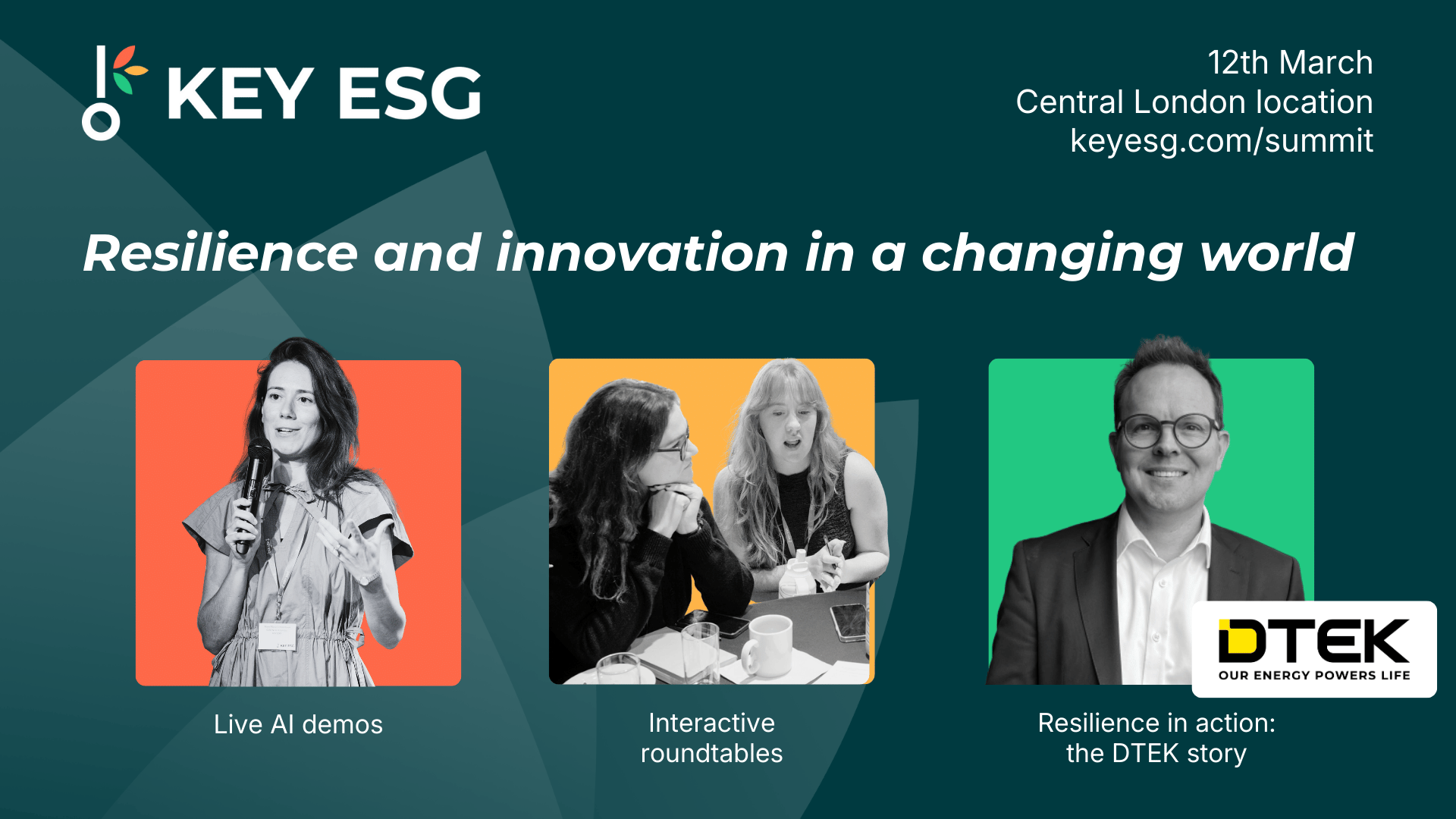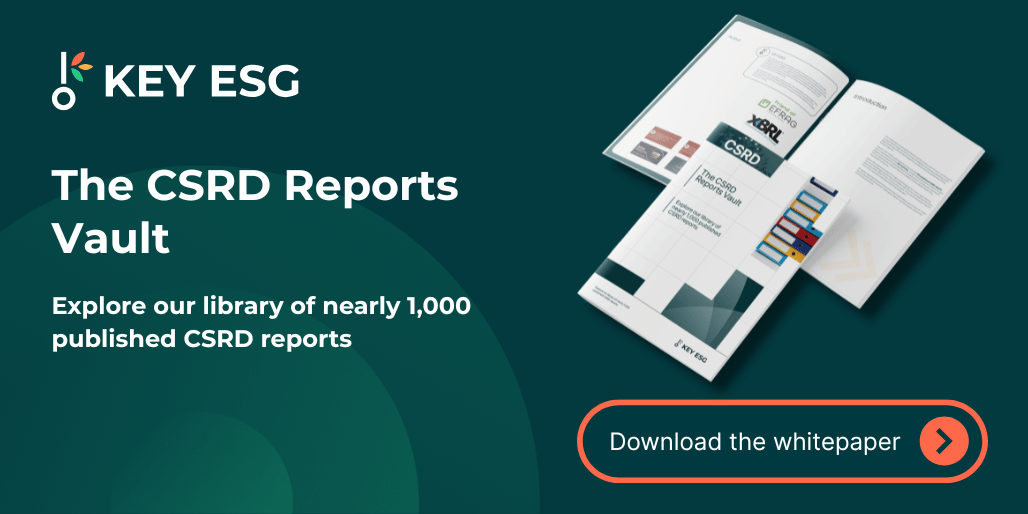Earlier this month, KEY ESG hosted an in-person workshop in London with sustainability leaders from across our client and prospect network. The session brought together practitioners from diverse sectors, ranging from logistics and healthcare to private equity and manufacturing, to explore the evolving challenges and opportunities of sustainability reporting and strategy.
Several key themes emerged, reflecting a broader industry shift and the important role KEY ESG can play in enabling it.
From reporting to real-world impact
The most striking insight from the conversation was the clear movement towards operationalising sustainability. Attendees agreed that sustainability is no longer a siloed exercise confined to reporting or compliance. Instead, it is becoming embedded in day-to-day operations, procurement, and strategic decision-making.
One participant shared how healthcare procurement requirements, like the NHS Net Zero roadmap, are influencing global strategy. Another highlighted efforts to drive climate impact across a portfolio of companies, viewing sustainability not as a reporting exercise but as a lever for long-term value.
This shift underscores KEY ESG’s unique positioning. Our platform is built for the normal business user, not just sustainability specialists. That means teams across procurement, finance, operations and beyond can directly engage with ESG data and decision-making - without needing to rely on a technical expert.
A new definition of sustainability
A common undercurrent was the reframing of what sustainability actually means. For many, especially those without mandatory disclosure obligations, sustainability is no longer simply about regulation - it’s about commercial, operational, and reputational outcomes.
One participant from a logistics company noted that, as a private firm, they are not required to report on sustainability but are seeking tools to meet growing expectations from customers. Another shared how portfolio companies vary widely in their maturity, requiring tailored, business-aligned strategies. The message was clear: sustainability is alive and evolving.
The ongoing Scope 3 conundrum
Scope 3 reporting remains a shared challenge. Several participants raised concerns about the limitations of spend-based methodologies, which can produce misleading results. For example, selecting a more sustainable (but higher-cost) supplier may increase reported emissions because it appears as a higher spend - despite representing a lower environmental impact in practice.
It was also noted that while many organisations have drafted strategies or lifecycle assessments (LCAs), the journey from ambition to implementation is rarely linear. Resource constraints, shifting requirements, and evolving methodologies can stall progress or make targets difficult to validate.
Unlocking the business case
Throughout the workshop, there was consensus that successful sustainability initiatives must be tied to clear business value. Real-world drivers such as national climate legislation, customer procurement requirements, and reputational risk were cited as key motivators.
However, many highlighted a disconnect between sustainability and finance. Several participants noted the difficulty of securing CFO buy-in when data gathering seems overwhelming or the return on investment is unclear. The group agreed that bridging this gap, through better storytelling, clearer metrics, and stronger internal alignment, will be critical to sustaining momentum.
Where KEY ESG fits in
As sustainability matures from compliance to strategy, and from strategy to operations, companies need tools that are adaptable, collaborative, and aligned with business realities. KEY ESG’s strength lies in enabling cross-functional ownership of sustainability: giving teams the tools to understand, act on, and reduce their impact, whether or not they are experts.
Looking ahead, the group also explored ideas such as sustainability scorecards and enhanced lifecycle assessment capabilities to better support evolving needs. These insights are helping to shape the future of our platform and deepen our partnerships with the companies leading this transition.
If you are interested in learning more about how your organisation could benefit from KEY ESG’s sustainability management platform, book a personalised demo today.
Earlier this month, KEY ESG hosted an in-person workshop in London with sustainability leaders from across our client and prospect network. The session brought together practitioners from diverse sectors, ranging from logistics and healthcare to private equity and manufacturing, to explore the evolving challenges and opportunities of sustainability reporting and strategy.
Several key themes emerged, reflecting a broader industry shift and the important role KEY ESG can play in enabling it.
From reporting to real-world impact
The most striking insight from the conversation was the clear movement towards operationalising sustainability. Attendees agreed that sustainability is no longer a siloed exercise confined to reporting or compliance. Instead, it is becoming embedded in day-to-day operations, procurement, and strategic decision-making.
One participant shared how healthcare procurement requirements, like the NHS Net Zero roadmap, are influencing global strategy. Another highlighted efforts to drive climate impact across a portfolio of companies, viewing sustainability not as a reporting exercise but as a lever for long-term value.
This shift underscores KEY ESG’s unique positioning. Our platform is built for the normal business user, not just sustainability specialists. That means teams across procurement, finance, operations and beyond can directly engage with ESG data and decision-making - without needing to rely on a technical expert.
A new definition of sustainability
A common undercurrent was the reframing of what sustainability actually means. For many, especially those without mandatory disclosure obligations, sustainability is no longer simply about regulation - it’s about commercial, operational, and reputational outcomes.
One participant from a logistics company noted that, as a private firm, they are not required to report on sustainability but are seeking tools to meet growing expectations from customers. Another shared how portfolio companies vary widely in their maturity, requiring tailored, business-aligned strategies. The message was clear: sustainability is alive and evolving.
The ongoing Scope 3 conundrum
Scope 3 reporting remains a shared challenge. Several participants raised concerns about the limitations of spend-based methodologies, which can produce misleading results. For example, selecting a more sustainable (but higher-cost) supplier may increase reported emissions because it appears as a higher spend - despite representing a lower environmental impact in practice.
It was also noted that while many organisations have drafted strategies or lifecycle assessments (LCAs), the journey from ambition to implementation is rarely linear. Resource constraints, shifting requirements, and evolving methodologies can stall progress or make targets difficult to validate.
Unlocking the business case
Throughout the workshop, there was consensus that successful sustainability initiatives must be tied to clear business value. Real-world drivers such as national climate legislation, customer procurement requirements, and reputational risk were cited as key motivators.
However, many highlighted a disconnect between sustainability and finance. Several participants noted the difficulty of securing CFO buy-in when data gathering seems overwhelming or the return on investment is unclear. The group agreed that bridging this gap, through better storytelling, clearer metrics, and stronger internal alignment, will be critical to sustaining momentum.
Where KEY ESG fits in
As sustainability matures from compliance to strategy, and from strategy to operations, companies need tools that are adaptable, collaborative, and aligned with business realities. KEY ESG’s strength lies in enabling cross-functional ownership of sustainability: giving teams the tools to understand, act on, and reduce their impact, whether or not they are experts.
Looking ahead, the group also explored ideas such as sustainability scorecards and enhanced lifecycle assessment capabilities to better support evolving needs. These insights are helping to shape the future of our platform and deepen our partnerships with the companies leading this transition.
If you are interested in learning more about how your organisation could benefit from KEY ESG’s sustainability management platform, book a personalised demo today.




.png)

